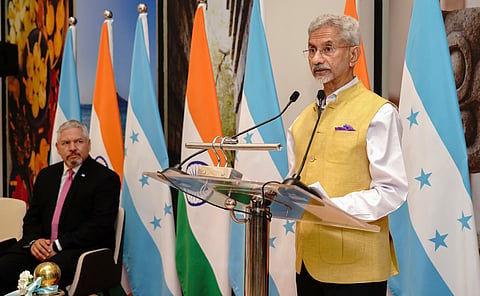

External Affairs Minister Dr S Jaishankar on Thursday emphasised India's stance on the suspension of Indus Water Treaty, stating that it will be held in abeyance until Pakistan finds a solution to cross-border terrorism.
"...The Indus Waters Treaty is held in abeyance and will continue to be held in abeyance until the cross-border terrorism by Pakistan is credibly and irrevocably stopped," Jaishankar said.
Addressing the media at the inauguration event of the Honduras Embassy in New Delhi, Jaishankar stated that they were one of the first countries that expressed strong solidarity following the deadly Pahalgam terror attack.
The minister also stressed that India received a lot of international support during Operation Sindoor, the retaliatory military operation against Pakistan.
"We actually got a lot of international support... We had a UNSC resolution that perpetrators must be held accountable, and on May 7th, they were held accountable through OperationSindoor," he said.
Emphasising that India's policy regarding third-party interference in issues related to Kashmir and Pakistan remains intact, Jaishankar said, "Our relations and dealings with Pakistan will be strictly bilateral. That is a national consensus for years, and there is absolutely no change in that."
The BJP-led central government has come under criticism from the opposition parties after President Donald Trump announced on May 10 that India and Pakistan agreed to a US-mediated ceasefire ending the days-long military conflict.
The opposition parties raised concerns regarding the Centre allowing a third party to interfere in issues pertaining to Pakistan and Kashmir and have demanded a special parliamentary session to discuss both Operation Sindoor and the alleged security failures during the Pahalgam terror attack.
Echoing Prime Minister Narendra Modi's words regarding further dialogues with Pakistan on Kashmir, Jaishankar said, "The only thing which remains to be discussed on Kashmir is the vacating of illegally occupied Indian territory in Pakistan-occupied Kashmir; we are open to that discussion."
"... The prime minister made it very clear that talks with Pakistan will be only on terror. Pakistan has a list of terrorists that needs to be handed over, and they have to shut down the terrorists' infrastructure. They know what to do. We are prepared to discuss with them what is to be done about terrorism. Those are the talks which are feasible," the minister said.
Commenting on the ceasefire agreement, Jaishankar said that India had achieved its goals by destroying terrorist infrastructure in Pakistan.
"We achieved the goals which we set out to do by destroying the terrorist infrastructure. Since key goals were achieved, I think we reasonably took the position, because even at the start of the operation, we had sent a message to Pakistan saying we are striking at terrorist infrastructure and not military and the military has an option to stand out and not interfere," he said.
"They chose not to take that good advice. Once they got badly hit on the morning of 10th May. The satellite pictures show how much damage we did and what little damage they did. It is clear who wanted cessation of firing," he added.
India carried out precision strikes on nine terror sites in Pakistan early on May 7, in response to the April 22 terror attack that killed 26 civilians in Jammu Kashmir's Pahalgam.
Subsequently, Pakistan responded with cross border firing, shelling and attacks on Indian military bases which was successfully thwarted by the military. Atleast 13 people, including children were killed as Pakistani airstrikes hit Jammu Kashmir's border areas of Poonch.
The Indian military targeted eight Pakistani air bases with missiles and other long-range weapons on May 10 in retaliation for Pakistan's attempts to strike 26 military facilities.
The hostilities ended with an understanding on stopping the military actions following talks between the Director Generals of Military Operations of both sides on the afternoon of May 10.